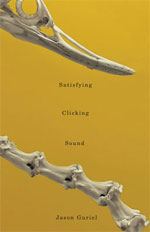When I graduated from university, I started to keep track of my books read in this wee diary that was a gift from my roommate.
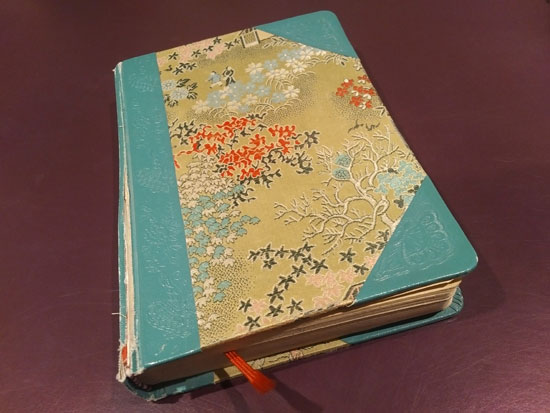
I started the books diary in 1983. It’s coming apart at the seams a bit. Over the years, I’ve backed up my list in databases, spreadsheets, Goodreads and other book apps du jour … but I’ve always updated this little diary as part of my reading routine. Yes, this book and this part of my reading ritual is getting on 34 years …
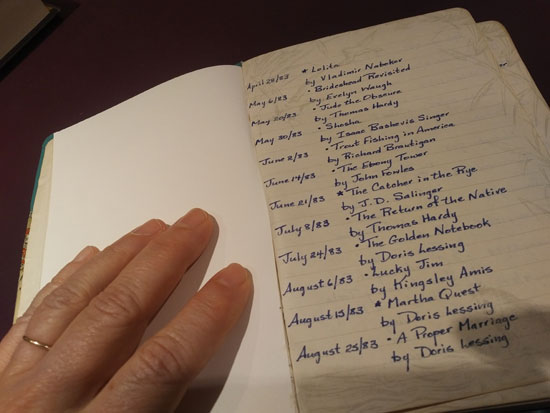
Here are the books I read in 2016 – once again, diligently recorded in my book diary, along with a backup spreadsheet and Goodreads – with links to reviews where I have them. By the way, this is an exhaustive, “all of” list, not a “best of” list.
I continued my commitment in 2016 to a daily devotion to at least one poem … and usually more, as friends on Twitter continued to generously share their poem choices and reflections via the #todayspoem hashtag. Now five years in, I still haven’t missed a day, both contributing and enjoying selections from others in this edifying, often spirit-lifting and vital communal experience. I’ve now pondered the works of close to 1,000 unique poets, writers, translators, songsmiths and wordsmiths I’ve revisited or unearthed myself, and countless more via others wielding that often revelatory hashtag. On into its sixth year, I’m continuing with my #todayspoem habit every day heading into 2017. I hope many contributors will continue or join anew.
I welcomed some wonderful and insightful guest reviewers and correspondents to this blog in 2016. I’m so grateful for the time and thought they spent on their pieces, from which I learned a lot and hope you did, too. Let’s revisit them again:
- Living with a Dead Language – My Romance with Latin, by Ann Patty
reviewed by Pauline Holdstock - Let’s go to the FOLD!
by Margrit Talpalaru - A Slim Green Silence, by Beverly Rycroft
reviewed by Kimmy Beach
Here are the books I read, reread and read aloud in 2016. Wherever I go, I try to carry a book with me, so for each book, I’m also going to try to recall where I was when I was reading it.
-
Hope Makes Love
by Trevor ColeI vividly recall reading this book at the cottage during the wintry first days of the new year.
-
The Beauty of the Husband
by Anne CarsonI was reading this amazing book while waiting for a friend who was arriving by GO Train at Toronto’s Union Station. We were meeting another friend to go to a poetry reading – how perfect is that?
-
Fates and Furies
by Lauren GroffI distinctly recall reading this engrossing book snuggled in bed.
-
A Little Life
by Hanya YanagiharaI went through a protracted period of insomnia last winter and if, after trying to relax and consciously breathe myself back to sleep, I was still wide-eyed in the dark, I would turn on my little book-light and read. This book actually didn’t help get me back to sleep – quite the contrary – but it was stunningly memorable company during those sleepless hours. What an unforgettable wallop of a reading experience.
-
The Mark and the Void
by Paul MurrayI read this two-volume paperback (a very interesting packaging of the story) mostly at our dining room table. It was February, when this household observes a month of abstinence from alcohol, so the accompanying beverages were likely tea and coffee.
-
Between You & Me
by Mary NorrisI took this entertaining book with me on more than a few subway rides.
-
When Words Deny the World
by Stephen HenighanThis book kept me company on streetcar rides to physiotherapy appointments.
-
The Brief Reincarnation of a Girl
by Sue GoyetteI read this gorgeous book (also a gorgeous book object) at home.
-
Just Watch Me – The Life of Pierre Elliott Trudeau (1968-2000)
by John English
(read aloud)A lot of our reading aloud takes place in the kitchen, with my talented husband cooking and me singing for my supper. We actually read a lot of this book during the interminable 2015 Canadian federal election and it was a great reminder that there were dedicated, thoughtful and honorable politicians of all political stripes as recently as just a generation or two ago.
-
M Train
by Patti SmithI read this sweet, luminous book at home.
-
All the Gold Hurts My Mouth
by Katherine LeytonThis poetry collection was company on several subway rides.
-
Birdie
by Tracey LindbergThis book was warm and fascinating company on streetcar rides to physiotherapy appointments.
-
Innocents and Others
by Dana SpiottaAmong his many talents, my husband is a great seeker and finder of first editions of books. When I fell in love with author Dana Spiotta on the basis of this intriguing New York Times Magazine interview, he made it his mission to find all of her novels for me. And then I read them all this year. To a book, they were amazing. I already can’t wait for what she’ll do next.
-
Don’t Be Interesting
by Jacob McArthur MooneyI read this collection (which had me at the John Darnielle references) at home and on public transit.
-
Model Disciple
by Michael PriorThis collection was fine company during the continued streetcar rides to physio appointments.
-
Tell: poems for a girlhood
by Soraya PeerbayeYou know what? I was so wrapped up in the entrancing, often horrifying but also heartwrenchingly beautiful world of this collection that I in fact don’t recall a specific place or moment when I was reading it. What does that say?
-
Lightning Field
by Dana SpiottaI read this book at home, probably mostly at my desk and the dining room table.
-
Providence
by Anita Brookner
(reread)I read this tiny, battered, much loved paperback on the subway, where a fellow passenger remarked that it was her favourite Brookner.
-
Frayed Opus for Strings & Wind Instruments
by Ulrikka S. Gernes, translated by Per Brask and Patrick FriesenThis poetry collection accompanied me on more than one road trip.
-
Who Needs Books? Reading in the Digital Age
by Lynn CoadyI pretty much read this in one sitting … with lunch.
-
Caribou Run
by Richard Kelly KemickI read this very fine collection at home, on public transit and I recall packing it along to the cottage, too.
-
The Mercy Journals
by Claudia CasperI remember reading this haunting novel late at night at the cottage.
-
Zero K
by Don DeLilloI vividly recall reading most of this book in an incredible, absorbing whoosh while driving home from the cottage. (No, I wasn’t driving.)
-
Saints, Unexpected
by Brent van StaalduinenI remember reading this fine and amiable book while relaxing on the back porch.
-
All That Sang
by Lydia PerovicI pretty much had this captivating book read in a couple of subway rides and a sit on the front porch.
-
Stone Arabia
by Dana SpiottaI remember being absorbed in this book while sitting on the cottage dock with a refreshing beverage or two.
-
The Quotations of Bone
by Norman DubieSubway reading, I do believe …
-
Independent People
by Halldor LaxnessThis one took a while to read – which was fine, as it was a read to savour and get immersed in – so I had it with me everywhere. It’s another book that a fellow subway rider remarked on, most enthusiastically.
-
I’m thinking of ending things
by Iain ReidI had the good sense to only read this book during daylight hours.
-
The Hatred of Poetry
by Ben LernerSome subway rides went quickly with this wise book for company.
-
Thirteen Shells
by Nadia BozakI was reading and enjoying this book during a weekend visit with friends at our cottage.
-
Yiddish for Pirates
by Gary BarwinThis book was thoroughly delightful company during a week’s vacation at the cottage.
-
History’s People
by Margaret MacMillan
(read aloud)We read this book aloud – and learned a lot about greater and lesser known historical figures – during cozy reading sessions at home and at the cottage.
-
The Cauliflower
by Nicola BarkerNot my favourite Barker, although Barker remains one of my favourite writers … I read this book while on my own for a working week at the cottage.
-
The Dancehall Years
by Joan HaggertyRemembering this book reminds me of our shade-dappled dock at the cottage.
-
The Clay Girl
by Heather TuckerI will remember The Clay Girl and the next book on this list, Still Mine, side by side and as my constant companions everywhere (home, out and about, cottage) for two or three weeks. I had the honour in 2016 of moderating a couple of special book club events for the Toronto Word on the Street Festival. Selected contest winners qualified for small, private book club meetings with authors Heather Tucker and Amy Stuart, and it was my job to introduce them to their book fans and keep the conversations going with pertinent questions about their respective books. I prepared exhaustively with questions and observations … but then didn’t need a lot of those preps because those book fans showed up excited, motivated and brimming with their own wide-ranging queries and reflections. It was really rewarding to see such warm and dynamic meetings of readers and writers – truly wonderful!
-
Still Mine
Amy StuartSee my comments about The Clay Girl … I also recall enjoying Still Mine on a coffee shop patio on a sunny Saturday morning while waiting for my husband.
-
English is Not a Magic Language
by Jacques Poulin, translated by Sheila FischmanThis charming novella was good subway company.
-
13 Ways of Looking at a Fat Girl
by Mona AwadI read this book at home and out and about.
-
The Best Kind of People
by Zoe WhittallI read this book at home and out and about.
-
The Last White House at the End of the Row of White Houses
by Michael e. CasteelsI recall being wrapped up in this enchanting little collection while waiting for my husband to join me for dinner out.
-
The Tobacconist
by Robert Seethaler, translated by Charlotte CollinsI read this fascinating and rather prophetic book at my desk in my home office, as I prepared the readers’ guide / book club questions for this book, offered by House of Anansi Press.
-
The Emily Valentine Poems
by Zoe WhittallA squirrel jumped up next to me on the park bench I was sitting on as I read this while waiting for a friend in a parkette outside her office in downtown Toronto.
-
Wenjack
by Joseph BoydenI read this small, moving book in one sitting at home.
-
Thrillows & Despairos
by Chris ChambersI discovered this collection when I heard Chris Chambers read from it at the 2016 International Festival of Authors, and I ran to the book table and purchased it right after the reading. Immersive indeed!
-
Do Not Say We Have Nothing
by Madeleine ThienThis beautiful book was constant, contemplative company at home throughout the fall.
-
The Goddess of Fireflies
by Genevieve Pettersen, translated by Neil SmithI remember standing on subway platforms with this book in my hand.
-
Where’d You Go, Bernadette
by Maria SempleI remember carrying and reading this sweet book on transit and waiting for friends at restaurants and before musical events in late November.
-
Eat the Document
by Dana SpiottaI read this intriguing book, the final in my year-long Dana Spiotta-fest, at home.
-
Based on Actual Events
by Robert MooreDevoured in just a few subway rides, I believe …
-
The Break
by Katherena VermetteI had this absorbing book with me at home, out and about and even on a wintry trip to the cottage.
-
Life On Mars
by Tracy K. SmithI stayed up late reading this gift on Christmas night.
-
Pond
by Claire-Louise BennettI treasure this quirky read, a spontaneous gift from a lovely colleague.
-
The Albertine Workout
by Anne CarsonAnother Christmas gift, I read this poetry pamphlet pretty much in one gulp while sitting at my home office desk.
"Love cannot enter through a guarded perimeter." @trevor_cole Hope Makes Love (@CormorantBooks) #sundaysentence
— Vicki Ziegler (@bookgaga) January 3, 2016
My #todayspoem choice is Tango XII by Anne Carson from The Beauty of the Husband (2000 @AAKnopf) https://t.co/cv4oNDmM88
— Vicki Ziegler (@bookgaga) January 8, 2016
"Loneliness is one of the few growth areas these days." Paul Murray, The Mark and the Void #sundaysentence
— Vicki Ziegler (@bookgaga) February 14, 2016
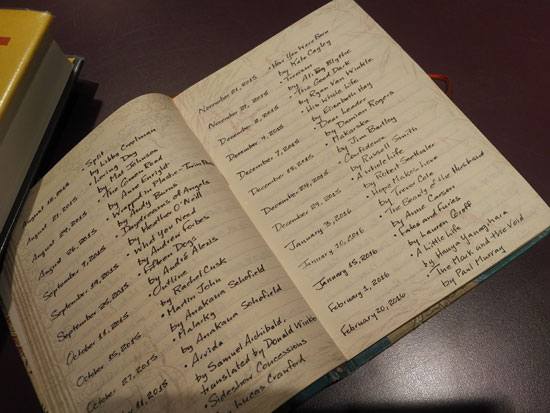
Before Sue Goyette's words take my breath away, Gaspereau Press' book artistry makes me sigh once again … pic.twitter.com/MxTZEWGTq8
— Vicki Ziegler (@bookgaga) February 4, 2016
"Yesterday's poets are today's detectives." Patti Smith, M Train #sundaysentence
— Vicki Ziegler (@bookgaga) February 28, 2016
#fridayreads Innocents and Others by Dana Spiotta & Don't Be Interesting by @McArthurMooney pic.twitter.com/PvlSEAg4JV
— Vicki Ziegler (@bookgaga) March 25, 2016
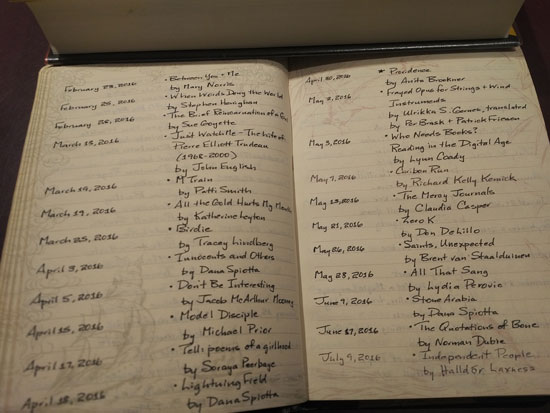
Post #wotsbookclub selfie with @bookgaga! We had so much fun. Can't say enough about this year's #WordOnTheStreet festival. ☀️📕 pic.twitter.com/0xn9BLsW6r
— Amy Stuart (@AmyfStuart) September 25, 2016
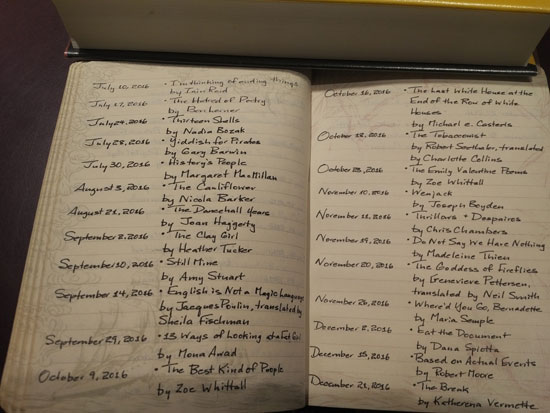
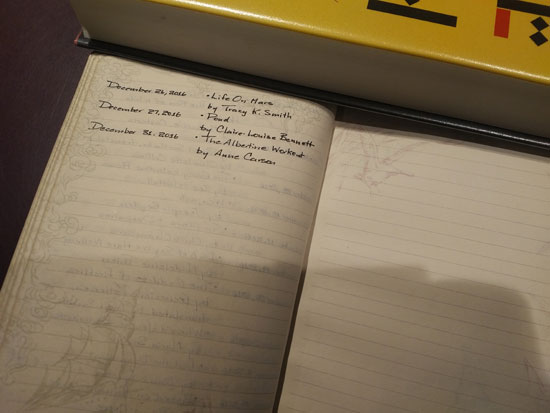
In 2016, I read a total of 54 works: 32 works of fiction (novels and short story collections), 15 poetry collections and 7 works of non-fiction. I re-read one book, read 4 works in translation, and read 35 works by Canadian authors. My husband and I read two books aloud to each other this year and have a third in progress as we greet the new year.
Currently in progress, heading into 2017:
-
Swing Time
by Zadie Smith -
The Two of Us
by Kathy Page -
Being a Dog
by Alexandra Horowitz
(read aloud)
Looking back fondly on my 2016 reading, looking forward eagerly and with anticipation to my 2017 reading, I’ll simply conclude (as I’ve done in previous years) …
It’s not how many you read that counts. It’s that you read that counts.
Postscript (added January 11, 2017)
I love the discussion this post has sparked, both here and on social media, including some debate about whether or not such list-keeping is usual or kind of nutty/anal-retentive. Obviously, keeping these lists every year is part of enjoying my reading. I’ve added a bit more to my scrutiny of what I’ve read every year, not so much with a view to altering the flow of what I decide to pick up and read every year as to just be aware if there was more or different directions in which I should explore. So, for example, I’ve looked in recent years at how much fiction vs non-fiction vs poetry I read, and how many works in translation, how much Canadian versus international literature, how many rereads, read-alouds, etc, etc, etc. Because the lists are easy to scan, I can quickly figure out the author gender mix every year … just to see how I’m doing, usually not to be corrective in my reading habits.
One thing I’ve decided to add to my record-keeping in 2017 is the publication year of each book read, to gauge how much current/hot-off-the-press vs back catalogue/older stuff I’m reading. I love that everyone who has joined this conversation loves their reading, loves to examine it to some extent and loves to share it. We all learn and benefit from that.
Another postscript (added March 17, 2017)
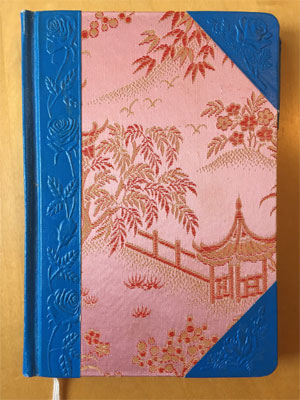 Sarah Emsley has segued a career teaching writing at Harvard University to her beautiful blog, where she writes about Jane Austen, Jane Austen for kids, Edith Wharton, Lucy Maud Montgomery and other writers, and about places she loves (especially Nova Scotia and Alberta). I am thrilled that she has taken a cue from this blog post to restart her own handwritten “books read” journal … and oh my, her journal and mine are twins!
Sarah Emsley has segued a career teaching writing at Harvard University to her beautiful blog, where she writes about Jane Austen, Jane Austen for kids, Edith Wharton, Lucy Maud Montgomery and other writers, and about places she loves (especially Nova Scotia and Alberta). I am thrilled that she has taken a cue from this blog post to restart her own handwritten “books read” journal … and oh my, her journal and mine are twins!










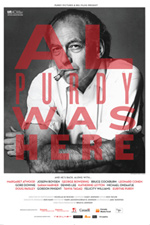

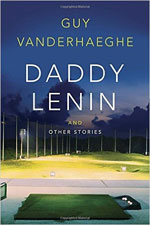
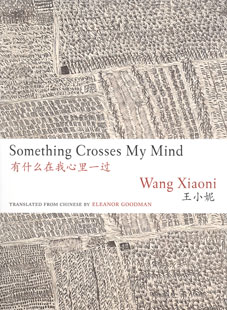 How do you read a poetry collection?
How do you read a poetry collection?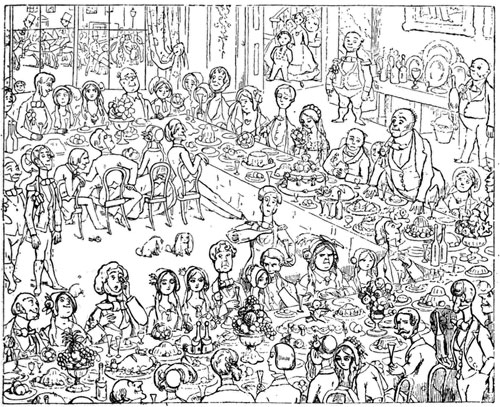
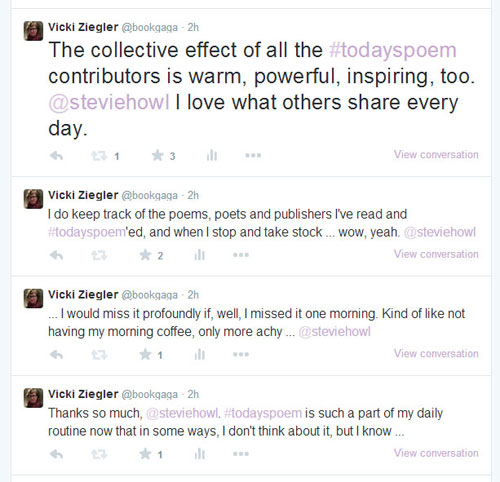
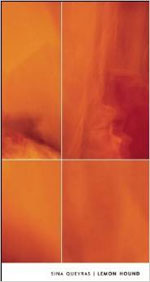 Poet Jacob McArthur Mooney recently sparked a discussion on Facebook about online publications with a mandate to publish new work by Canadian poets. With his go-ahead, I’m moving the list that resulted from the discussion here. Where I can find them, I’ve added links and Twitter handles. Broadening the definition just a bit, there are some publications on this list that have a print counterpart. I’ve also added a few web sites that go back a bit in terms of Canadian poetry history and archives, and some that might be now defunct in terms of publishing new material, but still offer interesting selections and back issues (and hey, you never know – sometimes these things come back to life!)
Poet Jacob McArthur Mooney recently sparked a discussion on Facebook about online publications with a mandate to publish new work by Canadian poets. With his go-ahead, I’m moving the list that resulted from the discussion here. Where I can find them, I’ve added links and Twitter handles. Broadening the definition just a bit, there are some publications on this list that have a print counterpart. I’ve also added a few web sites that go back a bit in terms of Canadian poetry history and archives, and some that might be now defunct in terms of publishing new material, but still offer interesting selections and back issues (and hey, you never know – sometimes these things come back to life!)